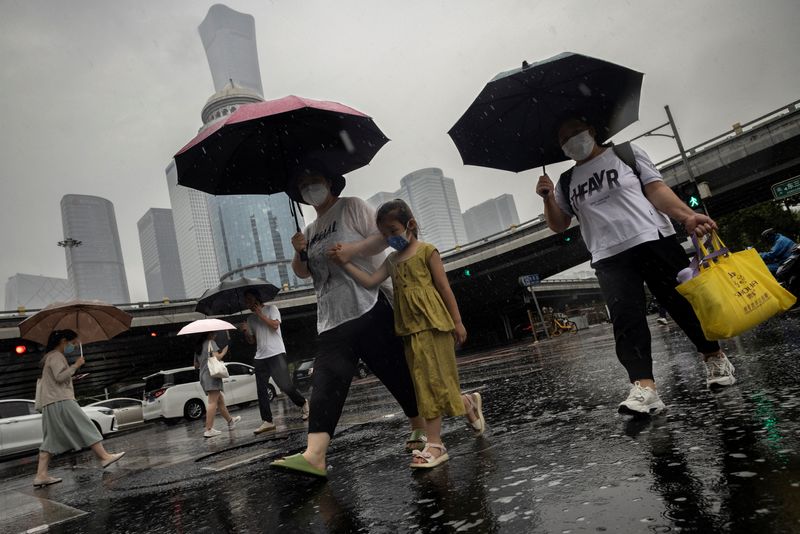By Joe Cash
BEIJING (Reuters) - Chinese President Xi Jinping's first major reform plans a decade ago were also his boldest, envisaging a transition to a Western-style free market economy driven by services and consumption by 2020.
The 60-point agenda was meant to fix an obsolete growth model better suited to less developed countries - however, most of those reforms have gone nowhere leaving the economy largely reliant on older policies that have only added to China's massive debt pile and industrial overcapacity.
The failure to restructure the world's second-largest economy has raised critical questions about what comes next for China.
While many analysts see a slow drift towards Japan-style stagnation as the most likely outcome, there is also the prospect of a more severe crunch.
"Things always fail slowly until they suddenly break," said William Hurst, Chong Hua Professor of Chinese Development at University of Cambridge.
"There is a significant risk in the short term of financial crisis or other degree of economic crisis that would carry very substantial social and political costs for the Chinese government. Eventually there's going to have to be a reckoning."
China came out of its Maoist planned economy in the 1980s as a largely rural society, badly in need of factories and infrastructure.
By the time the global financial crisis hit in 2008-09, it had already met most of its investment needs for its level of development, economists say.
Since then, the economy quadrupled in nominal terms while overall debt expanded nine times. To keep growth high, China in the 2010s doubled down on infrastructure and property investment, at the expense of household consumption.
That has kept consumer demand weaker as a portion of GDP than in most other countries and concentrated job creation in the construction and industrial sectors, careers increasingly spurned by young university graduates.
The policy focus also bloated China's property sector to a quarter of economic activity and made local governments so reliant on debt that many now struggle to refinance.
The pandemic, a demographic downturn and geopolitical tensions have exacerbated all these problems to the point that the economy has found it hard to recover this year even as China reopened.
"We're at a moment when we are seeing some structural shifts, but we should have seen these coming," said Max Zenglein, chief economist at MERICS, a China studies institute.
"We're just beginning to be confronted with the reality. We're in untested territory."
The end of China's economic boom will likely hurt commodity exporters and export disinflation around the world. At home, it will threaten living standards for millions of unemployed graduates and many whose wealth is tied up in property, posing social stability risks.
CRISIS VS STAGNATION
Aside from short-term solutions, which would likely only perpetuate debt-fueled investment, economists see three options for China.
One is a swift, painful crisis that writes off debt, curbs excess industrial capacity and deflates the property bubble. Another is a decades-long process in which China winds down these excesses gradually at the expense of growth. The third is switching to a consumer-led model with structural reforms that cause some near-term pain but help it re-emerge faster and stronger.
A crisis could unfold if the massive property market collapses in an uncontrolled way, dragging the financial sector with it.
The other high-stress point is local government debt, estimated by the International Monetary Fund at $9 trillion. China promised in July to come up with a "basket of measures" to address municipal debt risks, without detailing.
Logan Wright, a partner at Rhodium Group, says Beijing has to decide which portion of that debt to rescue, as the amount is too large to provide full guarantees of repayment, which the market currently regards as implicit.
"Crisis is going to occur in China when government credibility falters," he said.
"When all of a sudden funding is cut off for the remaining investments that seem subject to market risk, that's a huge moment of uncertainty in China's financial markets."
But given state control of many developers and banks and a tight capital account that limits outflows into assets abroad, that is a low risk scenario, many economists say.
Alicia Garcia Herrero, chief economist for Asia Pacific at Natixis, expects there would be plenty of buyers if Beijing consolidates debt given limited investment alternatives.
"I am more in the slow growth camp," she said. "The more debt is piled up for projects that are not productive, the lower the return on assets, particularly public investment, and that really means that China cannot grow its way out."
Avoiding a crisis by extending the adjustment period, however, has its own stability risks with youth unemployment topping 21% and around 70% of household wealth invested in property.
"One of China's biggest success stories, building a strong middle class, is also becoming its biggest vulnerability," said MERICS' Zenglein. "If you look at it from the perspective of a younger person, you are now at risk of being the first post-reform generation whose economic wellbeing might hit a wall. If the message is tighten up your belts and roll up your sleeves, that's going to be kind of a hard sell."
REFORMS, THIS TIME?
The third path, actively switching to a new model, is considered very unlikely, based on what happened to Xi's 60-point programme.
Those plans have barely been mentioned since 2015 when a capital outflows scare sent stocks and the yuan tumbling and engendered an official aversion to potentially disruptive reforms, analysts say.
China has since backed away from major financial market liberalisation while plans to rein in state behemoths and introduce universal social welfare never quite materialised.

"Right now is a time in which there's a potential for the train to change direction to a new model, and I think there's appetite to do that," said Hurst.
"But at the same time there's a great fear of the short-term political and social risk, especially of provoking an economic crisis."